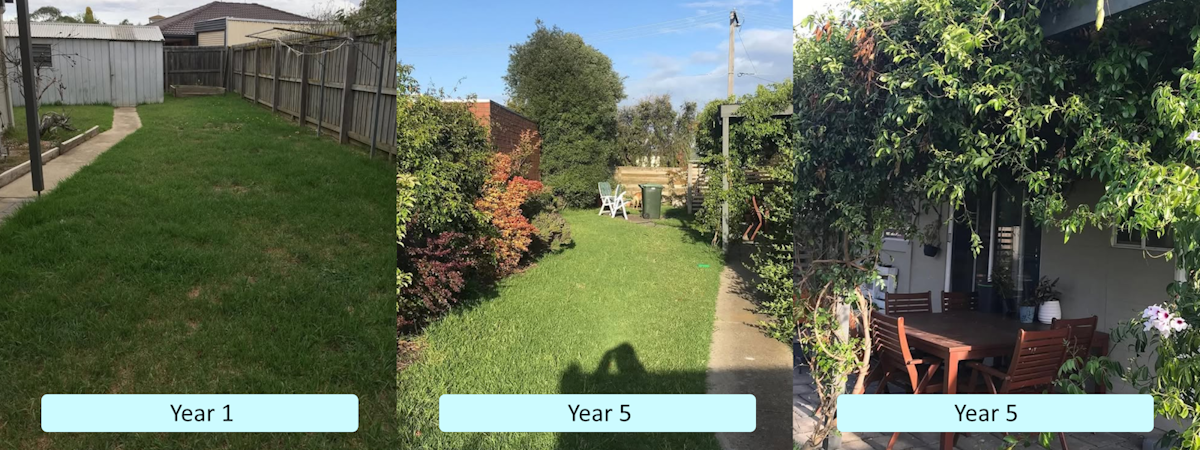Tips for home ownership
Be smart about home ownership; decisions you make today (whether good or bad) have considerable impact in five, ten, twenty years' time.

The key about property is that it is a long-term investment; decisions you make today (whether good or bad) have considerable impact in five, ten, twenty years time.
Below are (hopefully) smart decisions I've made over the years.
Disclaimer: I am not a qualified finance/property professional. This post is of my own observations of home ownership in Victoria, Australia. There are likely mistakes, missing information, or information not appropriate for you. You must seek the advice of a qualified professional before making any decisions.
Spend money wisely
Particularly in the early years of home ownership, paying an extra $250, $500, $1,000 each month shaves years off your 30-year homeloan, literally saving you hundreds of thousands of dollars. Try a Extra Repayments Calculator.
Unfortunately, in our consumerism-driven times, most people have too much 'stuff', and spend too much money of this stuff. Do they really need a brand new $3000 couch..?
My partner and I live minimally; if something must sit in a cupboard because there is no place for it to sit in the dining room or bedrooms, do we really need it? What stuff we do buy, 95% is second-hand; tables, bed frames, desks, chairs, lamps. We absolutely love Facebook Marketplace for stunningly beautiful furniture pieces at bargain prices. Most people seem surprised second-hand items are of such good quality.
All money saved goes into the mortgage.

Rent a room out
Before buying my first home I'd been renting for 10 years, always living with roommates. My first owned house had three bedrooms; my partner and I lived in the master room.
For five years we rented out one of the rooms (and at brief times both of the rooms). It was certainly a sacrifice and at times an annoyance, but the financial gain was worthwhile. For instance, $200/week of rent is $800 a month - that covered the entirety of our monthly utility bills and groceries, and the rest went into the mortgage. Two renters is $1600 a month gain.
Websites like Flatmates.com.au make finding candidates easy, and we always interviewed candidates beforehand to find one that suited our lifestyle and requirements.
Understandably not every homeowner would be comfortable with this arrangement, but it is certainly an option to consider for the short-term, to set you up better for the long-term.
Important: rent received contributes to your personal income which you must declare at tax time, and other tax incentives/costs (e.g. capital gains tax). Speak to a professional to understand the process first.
Be smart about improving your house's capital
Capital is how much your house is worth. It contributes to the profit you make when you sell. Calculating capital is complex; very roughly it is the sale price subtract how much you still owe on the mortgage + capital gains tax + seller fees.
Greatly simplified: the more capital the greater your profit.
I detest property investors. Houses should not be purchased as a "profit making investment"; they are a necessity for people and should not be in the hands of businesses. However, it is wise to invest in your own personal home.
House improvements cost considerable time, money, and energy. Be smart about how to improve it's condition and worth. Improvements do not need to be grand! My favourites:
- Garden improvements can have huge returns on investment, and contributes immensely to curb appeal. Tip: plant trees and plants immediately as they take many years to grow!
- Repairs: fix the broken window screening, the fence that is falling over, the scratches on the walls.
- Reasonable-cost improvements like an outdoor BBQ area, garden sheds, improved aesthetics (e.g. a nice front door) can improve the worth of the property.
It's all about appearance and appeal. View your house from the eyes of prospective buyers as they see your house for the first time during an open home inspection. Well implemented improvement projects can literally add thousands (or more) to the value of your home when you decide to sell.

Know your expenses
Assess yearly what your house is costing you and why:
- Shop around for a better house insurance deal.
- Evaluate why your electricity/gas/water bills are so high (poor insulation? leaking taps?).
- Consider cost saving measures such as installing solar panels, sealing gaps between doors/windows to improve insulation, only use the heater/AC unless you really need to (how many people have the heater on but are sitting in a t-shirt!).
Conclusion
Be smart, and your 60 year-old self who is close to retirement will thank your younger self for making smart decision early on.
